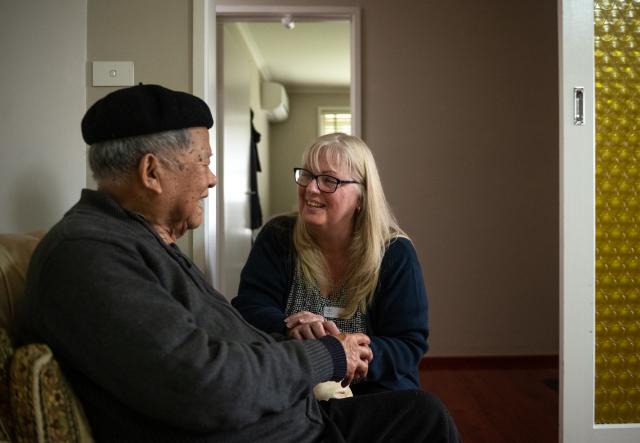
Mercy Palliative Care, the provider of community end-of-life care services across Melbourne’s west and in Sunshine, has won a national Good Samaritan Mission Award.
The award, for the ‘I Am Living’ public awareness initiative involving Mercy Health, Calvary Health Care and other Catholic health providers, was announced at the recent Catholic Health Australian national conference in Perth.
The I Am Living program, which centres on a series of short documentaries featuring palliative care patients, is designed to expand understanding of palliative care and address community anxiety around the deterioration of health, dying, death, loss and grief.
Patients featured in the videos speak about the things that matter to them as they face their own mortality and that hope-filled and positive experiences are possible, even in a hospital bed.
Mercy Palliative Care manager, Deanne Layton, said Mercy Health was quick to recognise the value of the I Am Living initiative.
“Programs such as these which raise the public awareness of palliative care and the conversations that people can have at the end of life are valuable,” she said.
“The video stories bring real life accounts of people receiving palliative care and the message of living until we die. These stories show there is much more to palliative care than just end of life care. Raising community awareness and encouraging people to talk is an important message from this campaign,” Ms Layton said.
Along with the Werribee Mercy Hospital, Mercy Palliative Care’s community-based service covers Wyndham, Brimbank, Maribyrnong, Hobsons Bay, Melton, Moonee Valley and Melbourne .
Its specialist teams include doctors, nurses, social workers and grief and bereavement counsellors.
The team also provides care to relieve psychological, financial and emotional burdens, with a particular focus on family care and support.
“I Am Living instills a deep reverence for each and every person as they matter to the last moment of their life,” said Calvary Health Care’s director of mission, Mark Green.
“The program dignifies the person’s suffering and demonstrates how, with care and support, a life is enhanced even as it draws to a close.”







